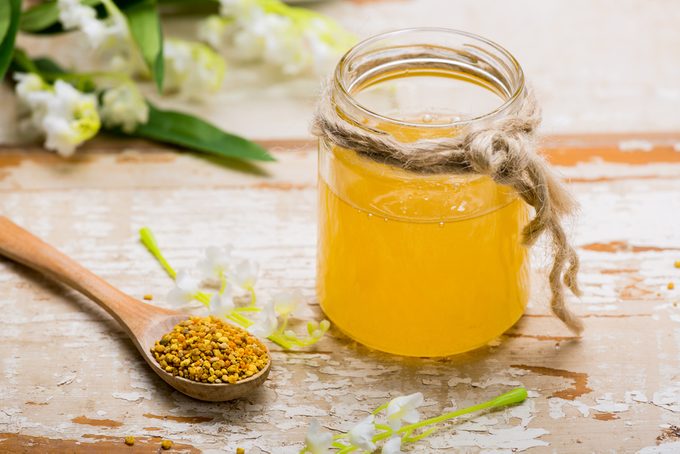Why Bee Pollen Is The Latest Superfood
The latest ingredient for optimal health? Bee pollen – one of the most nutrient-dense foods on the planet.

It’s the season of bounty! What better way to celebrate the good weather than indulging in the best of the summer harvest? I’m talking about tasty blueberries and cherries, savoury summer squashes, juicy watermelons, refreshing cukes, cherry tomatoes as sweet as candy, and flaky pies baked with sweet summer peaches. There’s one catch, though: We wouldn’t have any of our summer favourites if it weren’t for bees!
There are many things we can be proud of as Canadians, but one of the many that top my list is that we are leaders in efforts to protect bees. In 2015, the Ontario government was one of the first to sign on to permanently reduce 80 per cent of the bee-harmful neonicotinoid pesticides used on corn and soy seed.
Without bees, we wouldn’t have our summer favourites or the root veggies and tubers that sustain us through winter.
For this reason, I’m making this the summer of bee magic. That includes enjoying the best local honey, royal jelly, propolis and, this month’s featured ingredient, bee pollen, as cultivated and shared by my favourite local beekeepers.
Here’s why you might also want to hop on the bee train, which is truly the sweetest ride around.
The goods on bee pollen
Male bees collect pollen from flowers and combine it with their saliva (called nectar) to form small pellets of magical bee power (better known as bee pollen). The bees bring this pollen back to the hive as food for the colony. As they go from flower to flower collecting pollen, they also leave some behind. This is pollination, and it’s responsible for the incredible diversity in our food supply.
Why does this matter to us? Well, this pollen, which we can get at local farmers’ markets and health food stores, carries a power pack of health benefits for us.
The health benefits of bee pollen
Bee pollen is one of the most nutrient-dense foods on the planet. It is approximately 40 per cent protein and has dramatic benefits for our energy levels, thanks to its abundance of B vitamins. Bee pollen has antifungal, antimicrobial, antiviral, anti-inflammatory and anti-cancer properties and is protective of the liver and supportive of the immune system, which makes it helpful in preventing disease.
Studies have also shown that bee pollen has the ability to have a positive effect on the allergy response in the body. I’m telling you, these pellets have some serious flower power.
And that’s just the nutritional side: With its subtle sweetness and floral overtones, it tastes like nothing else on earth. Good bee pollen is rich and creamy and melts in your mouth.
The plan
When it comes to bee pollen, quality counts. Much of what we see in stores comes from bees harvesting pollen solely from cornfields. For this reason, there aren’t the same diverse floral notes that you’ll find in pollen from bees who were out in fields of wildflowers. As well, much of the bee pollen that is commercially available has been heated to make it shelf-stable and is often very dried out.
Quality pollen from your local beekeeper is the way to go. You want to ensure that it’s been stored in a fridge or freezer, and remember to do the same when you take it home.
Beekeeper’s Naturals is my go-to Canadian source for the best-tasting bee pollen (and other bee products, including honey and propolis spray) I’ve ever had.
Bee pollen is delicious added to smoothies, sprinkled over cereal and oatmeal, added as a topping to pancakes and waffles, mixed into veggie and fruit salads and even sprinkled on ice cream. And since it’s a power-packed superfood, it’s best to start small, with just half a teaspoon on its own at first to ensure that your body is on board. A little goes a long way.
Try it in a recipe: Bee Pollen Smoothie
Meghan Telpner is a bestselling author of UnDiet and The UnDiet Cookbook and founder of the Academy of Culinary Nutrition. More at meghantelpner.com. Follow her on Instagram and Twitter.




